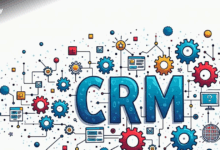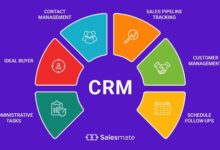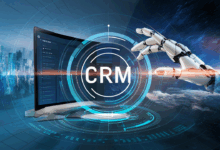CRM Software For Small Business: Streamlining Customer Relationships
CRM Software for Small Business opens up a world of possibilities for efficient customer relationship management. Dive into the realm of streamlined processes and enhanced customer satisfaction as we explore the ins and outs of this essential tool.
Overview of CRM Software for Small Business
CRM software, or Customer Relationship Management software, is a tool designed to help small businesses effectively manage their interactions and relationships with customers. It plays a crucial role in organizing customer data, improving communication, and enhancing customer satisfaction.
Key Features of CRM Software for Small Business
When selecting CRM software for a small business, it is important to consider the following key features:
- Centralized Customer Database: A CRM system should provide a centralized database where all customer information and interactions are stored, making it easy to access and update.
- Lead Management: The software should have lead tracking and management capabilities to help businesses nurture leads and convert them into customers.
- Communication Tools: Look for CRM software that offers communication tools such as email integration, SMS messaging, and social media management to streamline customer interactions.
- Task and Calendar Management: A CRM system should include features for task and calendar management to help businesses stay organized and on top of important deadlines and follow-ups.
- Reporting and Analytics: Choose CRM software that provides reporting and analytics tools to track key performance metrics, measure customer engagement, and make data-driven decisions.
- Customization Options: It is essential to select a CRM system that can be customized to meet the specific needs and workflows of a small business.
Benefits of Using CRM Software for Small Business
Implementing CRM software for small businesses comes with a multitude of advantages. This software can greatly improve customer retention and satisfaction by allowing businesses to track interactions, personalize communications, and provide better customer service.
Cost-Saving Opportunities
- Automating repetitive tasks such as data entry and email responses can save time and reduce labor costs.
- Targeted marketing campaigns based on customer data can lead to higher conversion rates and lower customer acquisition costs.
- Streamlining processes and improving efficiency can help minimize operational expenses.
Setting up a CRM Software System
Setting up a CRM software system for a small business involves selecting the right software provider, customizing the system to fit the business needs, and integrating it with existing tools and platforms. Training employees on how to use the software effectively is crucial for successful implementation.
Training Employees
- Provide hands-on training sessions to familiarize employees with the CRM software interface and features.
- Offer ongoing support and resources to help employees troubleshoot issues and maximize their use of the software.
- Encourage feedback and suggestions from employees to continuously improve the CRM software usage within the organization.
Comparison Table of CRM Software Options
| Software | Key Features | Pricing |
|---|---|---|
| HubSpot CRM | Lead management, email tracking, reporting | Free, with paid add-ons |
| Zoho CRM | Sales automation, forecasting, social CRM | Starting at $12/user/month |
| Salesforce CRM | Customizable dashboards, workflow automation, AI insights | Starting at $25/user/month |
Data Security Measures
- Encrypt sensitive customer data to protect it from unauthorized access.
- Regularly update the CRM software to patch security vulnerabilities and ensure data protection.
- Implement access controls to restrict user permissions and prevent data breaches.
Types of CRM Software Suitable for Small Business
CRM software comes in various types, each designed to cater to different business needs and requirements. Let’s explore the different types of CRM software suitable for small businesses and how to choose the right one based on your specific needs and budget.
Cloud-Based CRM Software
Cloud-based CRM software is a popular choice for small businesses due to its flexibility and accessibility. It allows businesses to access customer data and information from anywhere with an internet connection. This type of CRM software is scalable, making it suitable for businesses of all sizes. Cloud-based CRM software is typically subscription-based, allowing small businesses to pay for only the features they need.
On-Premise CRM Software
On-premise CRM software is installed and maintained on the company’s own servers and hardware. While this type of CRM software offers more control and customization options, it requires a larger upfront investment and ongoing maintenance costs. On-premise CRM software may be suitable for small businesses with specific security or compliance requirements.
Open-Source CRM Software
Open-source CRM software allows businesses to customize and modify the software to fit their unique needs. This type of CRM software is often free to use, making it a cost-effective option for small businesses with limited budgets. However, open-source CRM software may require technical expertise to implement and maintain effectively.
Mobile CRM Software
Mobile CRM software is designed for businesses that require access to customer data on the go. This type of CRM software allows employees to manage customer relationships from their mobile devices, increasing productivity and efficiency. Mobile CRM software is ideal for small businesses with remote or field-based teams.
Choosing the Right CRM Software
When selecting CRM software for your small business, consider your specific needs, budget, and long-term goals. Assess the scalability of the CRM software options available and choose one that can grow with your business. Look for features that are essential for your business operations, such as lead management, contact tracking, and reporting capabilities. Additionally, consider the level of support and training offered by the CRM software provider to ensure a smooth implementation process.
Features to Consider in CRM Software for Small Business
When choosing a CRM software for your small business, it is essential to consider specific features that can help streamline your operations and enhance customer relationships.
Contact Management, Lead Tracking, Reporting, and Email Marketing Automation
- Contact management: A CRM software should allow you to store and organize all customer information in one place for easy access.
- Lead tracking: The ability to track leads through the sales pipeline can help you prioritize efforts and focus on closing deals.
- Reporting: Detailed reports on sales performance, customer interactions, and other metrics can provide valuable insights for decision-making.
- Email marketing automation: Automating email campaigns can save time and ensure consistent communication with customers.
Mobile Accessibility and User-Friendly Interface
- Mobile accessibility: With the increasing trend of remote work, having a CRM software that is accessible on mobile devices is crucial for staying connected on the go.
- User-friendly interface: An intuitive interface can improve user adoption and efficiency in using the CRM software.
Industry-Specific Templates
- Real Estate: Templates for property listings, client follow-ups, and open house scheduling can help real estate agents manage their workflows effectively.
- Retail: Templates for inventory tracking, customer loyalty programs, and sales forecasting can assist retail businesses in managing their operations efficiently.
Data Security Measures
- Encryption: Protecting sensitive customer data with encryption ensures that information is secure and inaccessible to unauthorized users.
- Regular Backups: Scheduled backups of your CRM data can prevent data loss in case of system failures or cyber attacks, providing peace of mind for your business.
Implementation Process of CRM Software for Small Business
Implementing CRM software for a small business involves several key steps to ensure a smooth transition and effective use of the system. From setting up the software to training employees, each stage plays a crucial role in maximizing the benefits of CRM for your business.
Setting Up CRM Software
- Evaluate Your Needs: Assess your business requirements and choose a CRM software that aligns with your goals and objectives.
- Customize the Software: Tailor the CRM system to fit the specific needs of your business by configuring settings, fields, and workflows.
- Integrate with Existing Systems: Ensure seamless integration with other tools and software used in your business to streamline processes.
Data Migration and Training
- Prepare Data: Cleanse and organize your existing data before migration to ensure accuracy and consistency in the CRM system.
- Migrate Data: Transfer data from your old systems to the CRM software while maintaining data integrity and security.
- Train Employees: Provide comprehensive training to ensure all employees understand how to use the CRM system effectively for their respective roles.
Overcoming Implementation Challenges
- Resistance to Change: Address resistance by involving employees in the decision-making process and highlighting the benefits of CRM software for their daily tasks.
- Lack of User Adoption: Encourage user adoption through ongoing support, training, and demonstrating the value of CRM in improving productivity and customer relationships.
- Data Security Concerns: Implement robust security measures and data encryption protocols to protect sensitive information stored in the CRM system.
Cost Analysis of CRM Software for Small Business
When considering CRM software for small businesses, it is essential to conduct a thorough cost analysis to ensure you are getting the best value for your investment.
Breakdown of Costs
- Initial Setup Costs: This includes the cost of purchasing the software, training employees, and customizing the system to fit your business needs.
- Subscription Fees: Many CRM software providers offer monthly or annual subscription plans, which can vary based on the number of users and features included.
- Integration Costs: If you need to integrate the CRM software with other tools or systems, there may be additional costs involved.
- Support and Maintenance Costs: Ongoing support and maintenance fees are common with CRM software to ensure smooth operation and updates.
Pricing Models
CRM software providers offer various pricing models, including monthly subscriptions, one-time purchases, and freemium options. It is crucial to evaluate which model aligns best with your budget and business requirements.
Optimizing Budget
- Define Your Needs: Identify the essential features required for your business to avoid overspending on unnecessary functionalities.
- Compare Providers: Research and compare different CRM software providers to find the best value for your budget.
- Negotiate Pricing: Don’t hesitate to negotiate prices or seek discounts from CRM software vendors to optimize your budget.
Comparison of CRM Providers
| CRM Software | Pricing Tiers | Key Features |
|---|---|---|
| Provider A | Basic, Standard, Pro | Lead Management, Email Marketing, Reporting |
| Provider B | Starter, Business, Enterprise | Customization, Workflow Automation, Customer Support |
Hidden Costs
Be cautious of hidden costs such as add-on features, data storage fees, and scalability costs that may impact your overall expenses.
ROI of CRM Implementation
Implementing a CRM system can result in improved efficiency, customer satisfaction, and revenue growth, leading to a positive return on investment for small businesses.
Integration of CRM Software with Existing Tools
When it comes to small businesses, integrating CRM software with existing tools can significantly enhance productivity and efficiency. By seamlessly connecting different applications, businesses can streamline workflows and improve customer interactions.
List of Popular Tools for Integration
- Email Marketing Platforms (e.g., Mailchimp, Constant Contact)
- Accounting Software (e.g., QuickBooks, Xero)
- Social Media Platforms (e.g., Facebook, Twitter)
- Customer Support Systems (e.g., Zendesk, Freshdesk)
- Marketing Automation Tools (e.g., HubSpot, Marketo)
Benefits of Integration
Integrating CRM software with other business applications offers several benefits, such as:
- Centralized Data: Access all customer information in one place
- Improved Communication: Sync communication across platforms
- Enhanced Automation: Automate repetitive tasks and workflows
- Personalized Customer Experience: Tailor interactions based on data
Examples of Streamlined Workflows
Integrating CRM software can streamline various workflows, such as:
- Automatically syncing customer data between CRM and email marketing platforms
- Creating invoices in accounting software directly from CRM customer records
- Routing customer support tickets from CRM to the appropriate team members
- Triggering marketing campaigns based on customer interactions captured in CRM
Importance of Mobile Accessibility in CRM Software
Mobile accessibility in CRM software is crucial for small businesses as it allows employees to access important customer data and manage relationships on the go. With the increasing reliance on mobile devices, having CRM software that is optimized for mobile use can greatly enhance productivity and efficiency.
Enhanced Productivity with Mobile CRM Applications
- Access to real-time customer information: Mobile CRM applications enable employees to access up-to-date customer data, allowing them to provide personalized service and make informed decisions while interacting with customers.
- Improved communication: Mobile access to CRM software ensures seamless communication between team members, even when they are not in the office. This leads to better collaboration and faster response times to customer inquiries.
- Increased flexibility: With mobile CRM applications, employees can easily update customer records, log interactions, and track sales from anywhere, at any time. This flexibility is especially beneficial for businesses with remote or field-based teams.
Tips for Optimizing CRM Software for Mobile Devices
- Choose a mobile-friendly CRM solution: When selecting CRM software for your small business, prioritize solutions that offer mobile apps or have responsive web designs for easy access on smartphones and tablets.
- Simplify user interface: Opt for CRM applications with intuitive interfaces that are easy to navigate on smaller screens. Streamlined layouts and clear menus can improve user experience and encourage adoption among employees.
- Ensure data security: Implement security measures such as encryption, multi-factor authentication, and remote data wiping to protect sensitive customer information accessed through mobile devices.
Data Security and Compliance Considerations
Data security is a critical aspect when it comes to implementing CRM software for small businesses. Protecting sensitive customer data should be a top priority to maintain trust and credibility with clients.
Implementing Encryption Protocols
- Utilize encryption protocols to safeguard sensitive customer data from unauthorized access or cyber threats.
- Implement Secure Socket Layer (SSL) encryption to secure data transmission between users and the CRM system.
- Utilize encryption algorithms to protect stored data within the CRM software.
Access Control Mechanisms
- Set up role-based access control to restrict access to customer information based on user roles and permissions.
- Implement multi-factor authentication to add an extra layer of security for user logins.
- Regularly review and update access control settings to ensure only authorized personnel can access sensitive data.
Regular Data Backups
- Establish a routine backup schedule to create copies of CRM data and ensure data recovery in case of security breaches or data loss.
- Store backup data in secure locations, either on-premises or in the cloud, with restricted access to prevent data leaks.
- Test data restoration processes periodically to verify the integrity of backup files and the effectiveness of the backup strategy.
On-Premises vs. Cloud-Based CRM Solutions
- On-premises CRM solutions offer more control over data security but require higher maintenance costs and expertise.
- Cloud-based CRM solutions provide scalability and accessibility but rely on the cloud provider’s security measures and compliance standards.
- Consider the specific security requirements of your small business when choosing between on-premises and cloud-based CRM solutions.
Impact of Data Breaches and Risk Mitigation
- Data breaches can severely damage a small business’s reputation and lead to financial losses, legal consequences, and customer distrust.
- Implement proactive security measures, such as regular security audits, employee training, and incident response plans, to mitigate data breach risks.
- Invest in cybersecurity insurance to protect your small business from the financial impact of data breaches and cyber attacks.
Employee Training on Data Security Protocols
- Provide comprehensive training for employees on data security best practices, including password management, phishing awareness, and data handling procedures.
- Conduct regular security awareness sessions to educate employees on the latest security threats and preventive measures to protect customer data.
- Empower employees to report suspicious activities or security incidents promptly to prevent data breaches and unauthorized access.
Customer Support and Training Options
Customer support and training are crucial aspects of choosing the right CRM software for small businesses. Let’s explore how different CRM software providers handle customer support inquiries and training options.
Comparison of Response Time for Customer Support Inquiries
- CRM Provider A: Average response time of 24 hours for customer support inquiries.
- CRM Provider B: Average response time of 12 hours for customer support inquiries.
- CRM Provider C: Average response time of 6 hours for customer support inquiries.
Availability of Live Chat Support vs. Email Support
- CRM Provider A: Offers live chat support during business hours and email support 24/7.
- CRM Provider B: Provides live chat support 24/7 and email support during business hours.
- CRM Provider C: Offers email support only, with a guaranteed response within 12 hours.
Types of Training Resources Offered
| CRM Software Provider | Training Resources |
|---|---|
| CRM Provider A | Video tutorials, webinars, knowledge base |
| CRM Provider B | Interactive online courses, user manuals, video tutorials |
| CRM Provider C | Live training sessions, FAQ section, user community forum |
Utilizing Training Resources Effectively
- Register for any available training sessions or webinars provided by your CRM software vendor.
- Explore the knowledge base and video tutorials to familiarize yourself with the CRM software functionalities.
- Engage with the user community forum to ask questions, share experiences, and learn from other users.
Role of Customer Forums and Online Communities
Customer forums and online communities can be valuable resources for troubleshooting issues, exchanging best practices, and getting real-time feedback from other CRM software users.
Case Studies of Successful CRM Software Implementation
CRM software has proven to be a game-changer for many small businesses. Let’s delve into some real-life examples of small businesses that have successfully implemented CRM software to enhance their operations, customer relationships, and overall business growth.
Case Study 1: XYZ Boutique
- XYZ Boutique, a small clothing store, implemented a cloud-based CRM software to manage customer interactions and sales data.
- They customized the CRM software to track customer preferences, purchase history, and send personalized marketing campaigns.
- By using CRM software, XYZ Boutique saw a 20% increase in customer retention and a 15% boost in sales within the first year of implementation.
Case Study 2: ABC Tech Solutions
- ABC Tech Solutions, a small IT consulting firm, adopted a CRM software to streamline client communication and project management.
- They integrated the CRM software with their email and calendar tools to ensure timely follow-ups and task assignments.
- After implementing CRM software, ABC Tech Solutions reduced response time by 30% and improved client satisfaction ratings by 25%.
Case Study 3: DEF Catering Services
- DEF Catering Services utilized a CRM software with a mobile app to manage event bookings, customer inquiries, and menu customization.
- They tailored the CRM software to automate catering proposals, track event timelines, and send feedback surveys post-event.
- With CRM software in place, DEF Catering Services witnessed a 40% increase in event bookings and a 20% rise in customer referrals.
Common Mistakes to Avoid When Using CRM Software
When it comes to utilizing CRM software for small businesses, there are common pitfalls that can hinder the effectiveness of the system. Being aware of these mistakes and knowing how to avoid them is crucial for maximizing the benefits of CRM software and ensuring a positive return on investment.
Lack of Proper Training and Onboarding
One common mistake that small businesses make when implementing CRM software is not providing adequate training and onboarding for their employees. Without proper guidance on how to use the system effectively, employees may not fully utilize all the features and functionalities, leading to underutilization of the CRM software.
Neglecting Data Quality and Maintenance
Another common pitfall is neglecting to maintain the quality of data entered into the CRM system. Inaccurate or outdated information can lead to poor decision-making and ineffective communication with customers. Regularly updating and cleaning the data is essential for ensuring the accuracy and reliability of the CRM software.
Overlooking Customization and Personalization
Some small businesses make the mistake of overlooking the importance of customizing and personalizing their CRM software to suit their specific needs. By tailoring the system to align with the unique requirements of the business, companies can enhance user experience, improve efficiency, and ultimately drive better results.
Failure to Align CRM Strategy with Business Goals
A critical mistake that businesses often make is failing to align their CRM strategy with their overall business goals. Without a clear understanding of how CRM software can support key objectives such as increasing sales, enhancing customer satisfaction, or improving marketing campaigns, the system may not deliver the desired outcomes.
Ignoring Feedback from Users
Ignoring feedback from users of the CRM software is another common mistake that can hinder its effectiveness. Users often have valuable insights and suggestions for improving the system based on their day-to-day experiences. By actively listening to and incorporating user feedback, businesses can optimize the functionality and usability of the CRM software.
Future Trends in CRM Software for Small Business
As technology continues to advance at a rapid pace, the future of CRM software for small businesses is set to undergo significant transformations. Emerging technologies are poised to revolutionize the way businesses interact with their customers, streamline processes, and drive growth. Let’s explore some of the key trends that are shaping the future of CRM software for small business.
Impact of AI, Automation, and Analytics
AI, automation, and analytics are expected to play a pivotal role in the evolution of CRM software for small businesses. These technologies have the potential to enhance customer interactions, automate routine tasks, and provide valuable insights into customer behavior. By leveraging AI-powered chatbots, automated workflows, and predictive analytics, businesses can deliver personalized experiences and make data-driven decisions.
Evolution of CRM Software Features and Functionalities
CRM software features and functionalities are likely to evolve to meet the changing needs of small businesses. We can expect to see increased customization options, seamless integration with other tools and platforms, and enhanced mobile capabilities. The focus will be on providing a more holistic view of customer data, optimizing processes, and improving overall efficiency.
Potential Integration of Virtual and Augmented Reality
Virtual and augmented reality technologies may find their way into CRM software, offering innovative ways for businesses to engage with customers. These immersive technologies can create interactive experiences, such as virtual product demonstrations or augmented reality shopping experiences, to enhance customer engagement and drive sales.
Rise of Customer Data Platforms (CDPs)
Customer Data Platforms (CDPs) are becoming increasingly popular as businesses look for more efficient ways to manage and leverage customer data. CDPs consolidate customer data from multiple sources, providing a comprehensive view of customer interactions. Integrating CDPs with CRM software can help businesses better understand their customers, personalize marketing campaigns, and improve overall customer satisfaction.
Selection Criteria for Choosing the Right CRM Software
Choosing the right CRM software for your small business is crucial for effective customer relationship management. Here are some key factors to consider when selecting CRM software:
User Reviews, Demo Evaluations, and Trial Periods
- Check user reviews to understand the experiences of other businesses with the CRM software.
- Request a demo to see how the software works and if it aligns with your business needs.
- Utilize trial periods to test the software’s functionality and suitability before making a commitment.
Assessing and Choosing CRM Software
- Identify your business requirements and goals for CRM software implementation.
- Create a list of essential features needed for effective customer relationship management.
- Compare different CRM software options based on features, pricing, and scalability.
Scalability and Integration Capabilities
- Ensure the CRM software can scale with your business growth and accommodate increasing data and user needs.
- Evaluate integration capabilities to seamlessly connect with existing tools and systems.
Data Security and Compliance Requirements
- Verify that the CRM software meets data security standards and compliance regulations relevant to your industry.
- Consider data encryption, access controls, and regular security updates in your selection process.
Customization Options and Business Alignment
- Explore customization features in CRM software to tailor the system to your specific business processes and workflows.
- Ensure that the software aligns with your business needs and can adapt to changing requirements over time.
Calculating ROI and Vendor Evaluation
- Determine the potential return on investment by analyzing cost savings, revenue growth, and productivity improvements from CRM software implementation.
- Evaluate the vendor’s reputation, customer support quality, and available training resources to assess long-term partnership viability.
Final Summary
In conclusion, CRM Software for Small Business serves as a game-changer in optimizing customer interactions and boosting business growth. Embrace the power of CRM software to take your small business to new heights of success.




